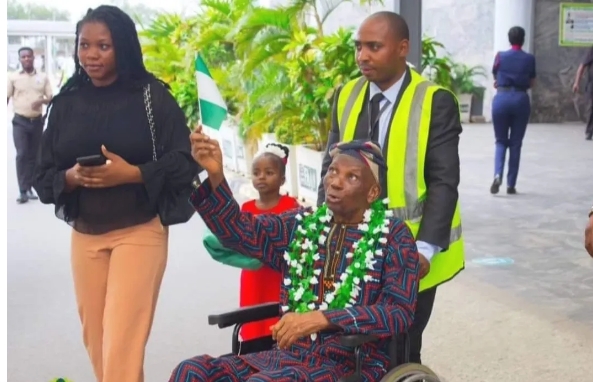A son of the deceased revealed that the family was paying ₦2,000 a day to keep the body at a morgue.

The family of Pa Taiwo Akinkunmi has finally laid the late designer of Nigerian national flag to rest after a year-long wait for a promised state funeral that never materialized.
The designer of Nigerian flag, Michael Taiwo Akinkunmi, had little recognition till his death at the age of 87 in August 2023. He was meant to be honored with a state funeral by the Federal Government of Nigeria, but the family grew tired of waiting and decided to proceed with the burial.
Samuel Akinkunmi, the Nigerian flag designer’s son, had said in a June report that that his dad, despite the way he was “neglected” by successive Nigerian governments, was “patriotic till the very end”.
Samuel said that the Akinkunmi family was already planning to bury him when the government stepped in, pledging to honour him with “a proper state burial”.
“After my dad died on August 29, 2023, the entire family held a meeting and later reached an agreement that he would be buried between December 10 and 11, 2023,”he told an investigative news outlet.
“However, that particular period coincided with the time representatives from the Oyo State Government came to pay a condolence visit to us.
“At the federal level, officials from the National Orientation Agency (NOA) also visited us.
“It was during their visit that they declared that because my father was a national hero, they were going to ensure that he was given a befitting state burial.
“Unfortunately, that was the last time we heard from the officials of both arms of government. Because of the pledge that they made, however, we were then left in a dilemma on what we were supposed to do next.
“We could no longer go ahead to bury my dad in our own little way as a family because the government had stepped in, and we also no longer heard from the government as per the promise they made.
“We wrote several mails to both the Oyo State Government and the federal government to call their attention to the promise they made, but we did not get any response from them.”
Following the report, the National Institute for Cultural Orientation (NICO), assured the family of late Pa Michael Taiwo Akinkunmi of getting a befitting burial. This promise never materialized.
However, the interment of Akinkunmi was preceded by a funeral service held at the Obafemi Awolowo Stadium on Liberty Road, Ibadan. The service had scant attendance, primarily consisting of representatives of the Oyo State Government, students from Akinkunmi’s alma mater, family members, parishioners of Gospel Faith Mission International (GOFAMINT), and the national choir.
Speaking on behalf of the family, Akinkunmi Akinwumi, the son of the deceased, said the family proceeded with the burial after the federal government failed to fulfill its promise of a befitting burial.
Akinwunmi Akinkunmi revealed that the family was paying ₦2,000 a day to keep the body at a morgue.
Meanwhile, Oyo State Government funded the burial rites which started on Wednesday, and ended on Friday, in Ibadan, according to local news outlets.
In his remarks, the acting governor of Oyo State, Bayo Lawal, said that governments at all levels have much to do to immortalize and sustain the legacies of Taiwo Akinkunmi. Describing Akinkunmi as a national figure, Lawal argued that the burial should have been a federal government affair rather than being left to the deceased’s family and the Oyo State Government.
Lawal noted that Akinkunmi’s legacies, including designing the flag, emphasize that unity and peace are crucial for national development. He added that the green in the national flag reminds the nation’s leaders of the imperative to maximize the nation’s potential in agriculture and solid minerals for its prosperity.
Delivering a sermon at the funeral service, General Secretary of GOFAMINT, Pastor Femi Omowumi, said Akinkunmi demonstrated that one need not hold a political office to contribute to the development of the nation.



During the transition into an independent state in 1958, the Nigerian government advertised a competition in a handful of newspapers, calling for the submission of flag designs.
Akinkunmi, then a 22-year-old student at Norwood Technical College, London, United Kingdom, registered his interest in the competition and submitted an entry: a rectangular flag divided into equal strips of green, white and green. On the white strip in the middle was the sun. The green color represented agriculture, and the white colour depicted peace. The red sun Akinkunmi drew in the middle of the flag represented energy.
Out of about 3,000 entries, Akinkunmi’s design was selected as the overall best. The red sun he had drawn in the middle of the flag was, however, removed, leaving Nigeria with a green, white and green flag.
The reason the red sun was taken out of Akinkunmi’s submission was never explained to him. He also never got much for creating the flag, even though some other Nigerians who made contributions to the country’s independence were recognised in public and essentially immortalised.
